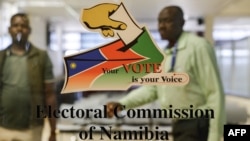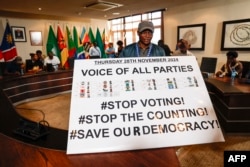Namibia extended voting for a second time Thursday with the opposition crying foul after logistical failures prevented many people from casting their ballots in the closely fought election.
With the ruling party facing its strongest challenge yet, opposition parties called for a halt to the vote counting and said they had lost confidence in the process.
The polls are a key test for the liberation-era South West Africa People's Organization party that has governed the mineral-rich country since independence 34 years ago. But SWAPO is being challenged by a younger generation of voters frustrated by high unemployment and enduring inequalities.
About 1.5 million people in the sparsely populated desert nation were registered to vote in Wednesday's presidential and legislative elections.
Many were still in line when polls were scheduled to close at 9 p.m. Wednesday, some saying they were in line for 12 hours.
The Electoral Commission of Namibia kept some polling stations open overnight into Thursday and allowed others to begin ballot counting.
The disarray led to angry complaints from opposition parties, which suggested there may have been an attempt to limit voting amid a strong showing for the parties challenging SWAPO's grip on power.
The Electoral Commission said it had decided to keep 36 polling stations open on Friday and Saturday in response to the criticism and to accommodate anyone who had not been able to cast their ballot.
It acknowledged a range of problems that held up voting, including a shortage of ballot papers because of higher-than-expected turnout and the overheating of tablets used to verify voters.
In some cases, mobile voting teams left areas with voters still in the queues, it said.
The main opposition party, Independent Patriots for Change, led the calls for a halt in the process.
"We have a reason to believe that the [Electoral Commission] is deliberately suppressing voters and deliberately trying to frustrate voters from casting their vote," said IPC official Christine Aochamus.
The smaller Namibia Economic Freedom Fighters opposition party said it wanted the vote to annulled.
"This election process was not free," said representative Saddam Amushelelo. "We are not going to accept the election results."
The IPC's leader, former dentist and lawyer Panduleni Itula, is perhaps the strongest challenger to SWAPO's candidate, Vice President Netumbo Nandi-Ndaitwah, who could become the first woman to lead the country.
Analysts have said Nandi-Ndaitwah, 72, would be forced into a second round if she does not win more than half of the votes.
The long queues were "a signal that people really want a change," said Ndumba Kamwanyah, lecturer in the Department of Human Sciences at the University of Namibia.
"For me, it seems it's not good news for the incumbent party," he told AFP.
Some voters had given up after standing in line for hours in the sun and before voting was first extended on Wednesday night, said Maria Nambahu, who waited five hours to cast her ballot.
"It should have been better organized," the 25-year-old said. "That makes it unfair."
Edison Bernardo, a 25-year-old financial assistant, said there should be a rerun.
"People did not vote; many left the line," he told AFP. "If this is the actual election, there will definitely be riots."
Namibia is a major uranium and diamond exporter, but not many of its nearly 3 million people have benefited from that wealth in terms of improved infrastructure and job opportunities, analysts say.
Around 42% of Namibia's registered voters are younger than 35, the election authority says.






